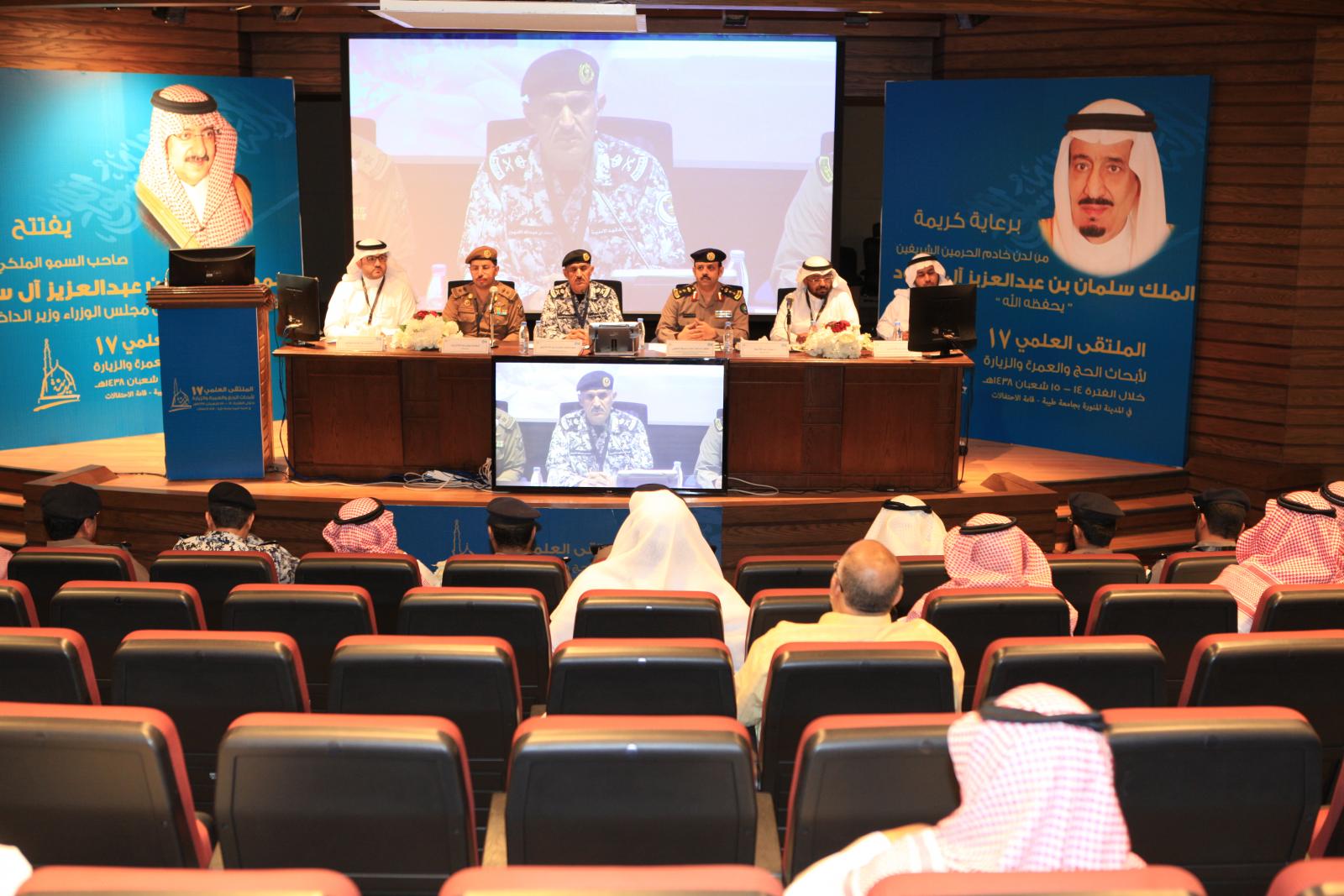
In the 17th Scientific Forum for Hajj, Umrah and Visit Research, organized by UQU represented by the Custodian of the Two Holy Mosques Institute for Hajj and Umrah Research in Madinah, and held currently at Taibah University, participants commenced the second day of the Forum with discussing some working papers presented in the 5th Scientific Meeting chaired by General Director of King Fahd Security College, General Major Saad Abdullah Alkhelawi, under the theme “Initiatives and Achievements in Services and Facilities Development”.
The meeting witnessed extensive discussions leading to various recommendations. In a paper on “The Journey of the Undersecretariat of the Ministry of Hajj and Umrah for Visit Affairs with Quality and Institutional Excellence to Serve the Guests of Allah”, the Undersecretary of the Ministry of Hajj and Umrah for Visit Affair Mohammed Bin Abdul Rahman Al-Bijawi highlighted the efforts exerted to serve pilgrims, Umrah performers and visitors, in compliance with quality and institutional excellence standards in planning, implementation, supervising and monitoring of the services provided.
He also addressed the plans and programs achieved within the Undersecretariat’s strategic objectives, the standardized documentation of the processes, and the performance indicators to boost institutional efficiency, as well as the plan’s operational goals and initiatives, noting that 82% have be achieved so far.
Also, from the Undersecretariat of the General Presidency of the Two Holy Mosques, Mu’adh Abdullah Ateeq Al-Harbi, Awad al-Hisony, Thamer Muhammad Al-Harbi and Abdulaziz Awad Al-Harbi, presented a paper titled, “Project of the Custodian of the Two Holy Mosques for Simultaneous Interpretation." In that paper, the researchers explored the effective role of simultaneous interpretation for the sermons and lessons delivered at the Two Holy Mosques into seven languages, as well as the translation of leaflets, pamphlets, electronic content on screensand banners the contents on the electronic screens and the media banners into the seven official languages (English - French - Urdu - Indonesian - Persian - Turkish - Hausa).
“Since its inception in 1435 A.H., this leading project has continuously developed over the past years”, they added.
Likewise, from the General Directorate of Safety, the General Directorate of Civil Defense in Madinah, Colonel Dr. Khaled bin Muraished Al Otaibi presented a paper on “The Effectiveness of Preventive Planning for Civil Defense Activities in Madinah During Hajj.” Here, stressed that preventive planning was commensurate with the fire, rescue, ambulance, and safety services.
“There are some constraints, but we need more support for preventive education efforts.”, said Dr. Khaled.
Dr. Al Otaibi also recommended to activate the role of engineering, consultancy and technical offices for fire prevention based on their respective responsibilities, and that of statistical units of to secure optimal safety. “We need to activate the role of statistical units at all departments of planning, and conduct more studies, analyses and preventive planning on the causes of incidents.
We also need to reconsider the mechanism of volunteering, unifying and organizing our efforts using specialized teams supervised by Civil Defense, to improve the efficiency of those involved in planning through advanced professional courses, to have proper coordination with Ministry of Hajj and Umrah, and to develop a strategic plan on pilgrims’ preventive awareness in coordination with Hajj missions.”, stated Dr. Al Otaibi.
Then, from the Public Security, Mushabbeb Abdullah Al Rumman presented his paper entitled, “The Role of the Special Force for the Security of the Holy Mosque in Serving Pilgrims.”, where he highlighted the efforts of the Special Force to provide pilgrims with security and tranquility all the time, stressing three key factors for his research, namely security, organization and human disposition.
“The Special Force has received integrated human, material and technical support by providing the department with qualified, talented and experienced staff to seamlessly organize the bi-directional movement of praying individuals in and out of the Holy Mosque”, said Al Rumman.
Finally, from UQU College of Applied Medical Sciences, Supervisor of the Institutional Transformation Directorate “Haramain Project” at the General Presidency for the Two Holy Mosques Dr. Ammar bin Abdullah Attar participated with a paper entitled, “Strategic Development of the Roles of the General Presidency for the Two Holy Mosques.”
Here, presented the “Haramain Project” as a long term strategic plan – a ten-years project form 1437A.H. to 1446A.H. “The project aims to develop an interim executive plan for five years, including programs and scientific initiatives derived from the long-term plan to secure its objectives. The plan also would find mechanisms to help conduct periodic follow-up and review.”, affirmed Dr. Ammar.